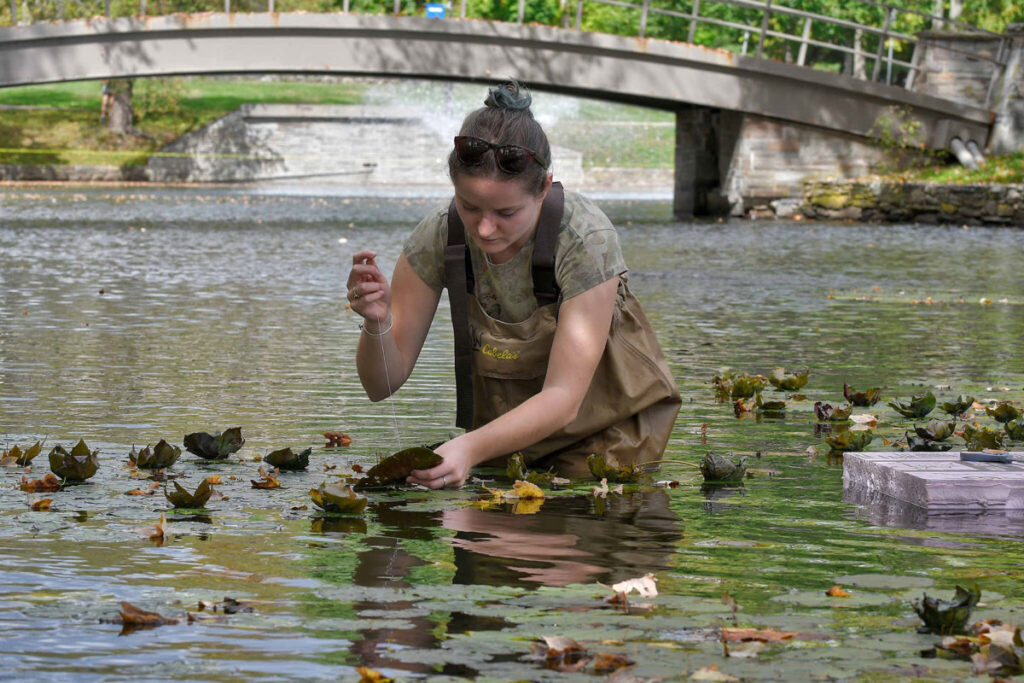Earn your Master of Science in Environmental Science in just one year after obtaining your Bachelor of Science degree at Wheaton. After fulfilling prerequisite requirements as an undergraduate, you may apply for the 4+1 M.S. in Environmental Science during your junior year. Once admitted into the program, you’ll begin taking master’s courses during your senior year, leading to a Master of Science in Environmental Science at the conclusion of your fifth year.
Through this accelerated program, you’ll learn advanced professional skills in environmental research, planning and policy, while gaining a deeper understanding of environmental social justice. You’ll be well-qualified to enter fields such as environmental monitoring and assessment, environmental consulting, climate change adaptation and planning, wildlife and natural resource management, and environmental advocacy. The 4+1 M.S. in Environmental Science also prepares you to pursue a doctorate degree or a career in environmental consulting, municipal, state and federal resource agencies, or nonprofit environmental organizations.
Explore Courses
4+1 M.S. in Environmental Science
Why Consider a 4+1 at Wheaton?
Accelerated Program
- Save time and money
- 5 years, 2 degrees
On Campus and Online
- On-campus bachelor’s degree program
- Online and asynchronous master’s courses
Curriculum Continuity
- Master’s courses align with Compass Curriculum
- Continue to learn with Wheaton faculty and staff
Competitive Edge
- Advanced degree leads to higher earning potential
- Make career connections through our Life and Career Design Institute
Program Highlights
The curriculum includes new courses to explore in your undergraduate years and through the 4+1 M.S. in Environmental Science. One area of study which will raise your resume to the top of the pile is Geographic Information Systems (GIS). You’ll acquire skills that are difficult to learn outside of the classroom but are in high demand in many natural and social science careers. You’ll learn to use ArcGIS software and apply it to basic environmental projects and problems. Then, you’ll learn advanced techniques for spatial data processing, especially by working with data collected in your thesis work.
During the summer after you earn your bachelor’s degree, you will design your own capstone research project in Environmental Science. You may conduct your thesis research locally within Massachusetts or internationally at a field station under the mentorship of a Wheaton faculty member.
4+1 M.S. in Environmental Science
Overview
The M.S. in Environmental Science consists of eight courses for a total of 32 credits. Two master’s-level courses taken during your undergraduate studies will count towards your advanced degree. Of the six remaining courses, two of them are taken over the summer. This includes a mentored field research experience paired with an online advanced data analysis course. The final four courses (two in fall, two in spring) are mostly asynchronous online during your fifth year.
Note: The 4+1 M.S. in Environmental Science is for current Wheaton students only. First year students, sophomores, juniors, and student-athletes with remaining NCAA eligibility are encouraged to inquire. For more information, contact Phoebe Chan, Special Advisor for the 4+1 Programs, at [email protected].
International students completing the 4+1 will not be eligible for Optional Practical Training (OPT). For OPT questions, contact [email protected].
To pursue the 4+1 M.S. in Environmental Science, you must complete the following courses prior to your senior year. These courses will prepare you for the interdisciplinary nature of the field while still making the requirements manageable, even if you are a non-science major.
- Intro to Environmental Science
OR BIO 201 Environmental Science
OR BIO 215 Ecology - Environmental Chemistry and Toxicology
OR CHEM 232 Aqueous Equilibria
OR CHEM 253 Organic Chemistry I - Intro to Geographic Information Systems (GIS) (offered Fall 2025)
- Any statistics course (BIO/PSY/SOC/MATH/MGMT)
Undergraduate Senior Year
- Environmental Senior Seminar
- Research Design and Practice in Environmental Science
Summer after Graduation
- Directed Research for Master’s Thesis
- Advanced Data Analysis in Environmental Science
Fall
- Advanced Geographic Information Systems (GIS)
- Environmental Policy and Law
Spring
- Directed Master’s Thesis Writing Seminar
- Environmental Sustainability and Social Justice
OR
Business and Environmental Sustainability
OR
Innovation for Social Impact
Alumni in Environmental Science
Life Scientist
U.S. Environmental Protection Agency (EPA)
New York, NY
Global Head of Environment and Sustainability
Takeda
Boston, MA
Environmental Health Safety Specialist
Thermo Fisher Scientific
Bedford, MA
Greenways Program Director
Neponset River Watershed Association
Canton, MA
Urban Farm Manager
Randall’s Island Park Alliance
New York, NY
Biologist
North Central Conservation District
South Windsor, CT
Fisheries Biologist
Hawaii Fish Company
Honolulu, HI
Environmental Scientist
Battelle
Norwell, MA
Ecologist
Wildland Consultants
Elsdon, Porirua, New Zealand
Environmental Chemist
Los Alamos National Labs
Los Alamos, NM
Urban Tree Program Manager
Groundwork
Providence, RI
Environmental Center Manager
Westminster College
Salt Lake City, UT
Pollinator Atlas Entomologist
RI DEM- Bureau of Environmental Protection
Rhode Island
Data Services Officer
African Wildlife Foundation
Washington, D.C.
Research Technician
Bigelow Laboratory for Ocean Sciences
East Boothbay, ME

